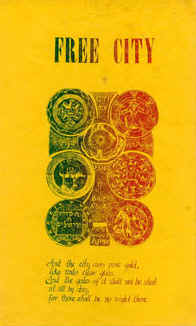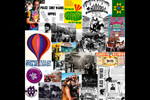A People's Hxstory* of the Sixties
To assure that our hxstory survives the
inevitable tendency of revisionism, it's critically important that we grow our own
versions of what happened and why. This page is where we will publish
recollections, memoirs, histories of the Digger movement and the rise of
the Sixties counterculture.
We have six chapters from Peter Coyote's memoir of the Sixties
(published as Sleeping Where I Fall, here as Free Fall Chronicles). We
also have Ramon Sender Barayon's Home Free Home, a detailed and
beautifully written hxstory of the Morningstar and Wheeler's Ranch free
land communities. There is an article on the Artists Liberation Front, and
a section for Oral Histories.
For any
social movement, there is a buildup, a prelude. The San Francisco Bay area provided a
fertile ground for the growth of new movements: artistic, political,
social, and cultural. The Diggers seemed to combine all these elements in
their ideas, and presented a message that appealed to hippies and
revolutionaries, to priests as well as poets. The following topics mark the digger movement's birth and rise in the
midst of the turbulent social hxstory of the mid-to-late sixties.
*[hxstory, pron.  but written to remove any gender implications.
the etymology of the word 'history'
is presumably gender-free and comes from the Latin word istoria (7th or
8th cent.) and earlier from ancient Greek ιστορια
meaning inquiry, research, account, description, written
account of past events, recorded
knowledge of past events, story, narrative.] but written to remove any gender implications.
the etymology of the word 'history'
is presumably gender-free and comes from the Latin word istoria (7th or
8th cent.) and earlier from ancient Greek ιστορια
meaning inquiry, research, account, description, written
account of past events, recorded
knowledge of past events, story, narrative.] Outline for a History of the Digger Movement
- Seeds (1955-65) (Precursors of the Counterculture)
- San Francisco Poetry Renaissance
- Beat Generation
- Civil Rights Movement
- Berkeley Free Speech Movement
- Student New Left
- Merry Pranksters and LSD
- Avant-Garde Art Scene
- S.F. Mime Troupe: Guerrilla Theatre
- Anti-War (née Peace) Movement
- Dutch Provos
- English Diggers (1649)
- Sprouts (1965-66) (Haight-Ashbury Coalescence)
- Psychedelic Shop
- The Trips Festival
- SF Mime Troupe Bust
- Acid Rock Dances
- The Fillmore & Family Dog
- San Francisco Oracle
- Love Pageant Rally
- The Love Book Bust
- Artists Liberation Front
- Hunter's Point Uprising
- ALF Free Fairs
- Love Pageant Rally
- The Human Be-In
- H.I.P. Merchants
- Hell's Angels
- Summer of Love
- Flowers (1966-68) (Digger Emergence)
- Early Digger Sheets/Articles
- Free Feeds in the Panhandle
- Free Frame of Reference, first free store
- Trip Without A Ticket
- H-A Free Clinic, Switchboard, Crash Pads
- Digger Public Events:
- Intersection Game
- Death of Money
- New Year's Wail
- Invisible Circus
- Easter Sunday on Haight Street
- End of War at the Straight
- Death of Hippie/Birth of Free
- Communication Company
- Black People's Free Store
- Morningstar Digger Farm & the Open Land movement
- Tie-Dye Shirts & Flak Jackets
- Digger Bread at All Saints Church
- New Seeds (1967 on) (Digger Movement Expands)
- Free City Collective
- Free City News sheets
- Free Food Home Delivery Service
- Black Panthers in Oakland
- City Hall Steps Noon Daily
- Poetry Bust
- Free City Convention
- A Modest Proposal
- The Digger Papers
- Summer Solstice 1968
- New York Com/Co Yippie!
- Berkeley Provos, L.A. Diggers
- Hearthshire/Hearth School (Free School)
- Free Print Shop
- Kaliflower
- Black Bear Ranch
- Olompali Ranch and the Free Oven
- Free Bakery at Jellyroll Press
- Angels of Light & Cockettes
- Free Food Family: Inter-Communal Bliss
- Planetedge Posters
- Planet Drum & the Bioregional Movement
- Earth Life Defense Committee
- Frisco Bay Mussel Group
- Food Not Bombs
- The Little Free Inn
- The Free Garden movement
- Free Farm Stand in the Mission
- Digger Resonance
- Anti-Nuclear Movement: Direct Action, Affinity Groups
- Winter 1983 Panhandle Free Food
- Really Really Really Free Market
- Other...
The Serendipity Quote
To authenticate a reminiscence, to ferret out small facts and make large
inferences, to see connections, to ambulate mentally — these are the tasks
of detectives who work with books. The wider their frame of reference and
the keener their skills, the more productive their detection. | They need
two guardians as well: a firm and unwavering skepticism at their right hand
and the Prince of Serendip at their left. Then their adventures will be all
but limitless, for the books that possess them are the record of life
itself.—"Adventures of a Literary Sleuth" by Madeleine B. Stern
Herodotus of Halicarnassus here presents his research so that human
events do not fade from time. May the great and wonderful deeds—some brought
forth by the Hellenes, others by the barbarians—not go unsung; as well as
the causes that led them to make war on each other.
With reference to the speeches in this history, some were delivered
before the war began, others while it was going on; some I heard myself,
others I got from various quarters; it was in all cases difficult to carry
them word for word in one's memory, so my habit has been to make the
speakers say what was in my opinion demanded of them by the various
occasions, of course adhering as closely as possible to the general sense of
what they really said. And with reference to the narrative of events, far
from permitting myself to derive it from the first source that came to hand,
I did not even trust my own impressions, but it rests partly on what I saw
myself, partly on what others saw for me, the accuracy of the report being
always tried by the most severe and detailed tests possible. My conclusions
have cost me some labour from the want of coincidence between accounts of
the same occurrences by different eye-witnesses, arising sometimes from
imperfect memory, sometimes from undue partiality for one side or the other.
The absence of romance in my history will, I fear, detract somewhat from its
interest; but if it be judged useful by those inquirers who desire an exact
knowledge of the past as an aid to the interpretation of the future, which
in the course of human things must resemble if it does not reflect it, I
shall be content. In fine, I have written my work, not as an essay which is
to win the applause of the moment, but as a possession for all time.
Marc Bloch (1886-1944, shot by a Nazi Gestapo death squad)
In a word, a historical phenomenon can never be understood apart from its
moment in time. This is true of every evolutionary stage, our own and all
others. As the old Arab proverb has it: "Men resemble their times more than
they do their fathers." Disregard of this Oriental wisdom has sometimes
brought discredit to the study of the past. —The Historian's Craft,
p. 29
Barbara Tuchman (1912-1989)
The writer of history, I believe, has a number of duties vis-à-vis
the reader, if he wants to keep him reading. The first is to distill. He
must do the preliminary work for the reader, assemble the information, make
sense of it, select the essential, discard the irrelevant—above all, discard
the irrelevant—and put the rest together so that it forms a developing
dramatic narrative. Narrative, as it has been said, is the lifeblood of
history. To offer a mass of undigested facts, of names not identified and
places not located, is of no use to the reader and is simple laziness on the
part of the author, or pedantry to show how much he has read. To discard the
unnecessary requires courage and also extra work, as exemplified by Pascal's
effort to explain an idea to a friend in a letter which rambled on for pages
and ended, "I am sorry to have wearied you with so long a letter but I did
not have time to write you a short one." The historian is continually being
beguiled down fascinating byways and sidetracks. But the art of writing—the
test of the artist—is to resist the beguilement and cleave to the subject.—Practicing
History, p. 17
Howard Zinn (1922-2010)
The Role of the Historian
We need to become the critics of the culture rather than its apologists
and perpetuators. We who are fortunate in having the resources of knowledge
are especially equipped for such a task. Although obviously not remote from
the pressures of business, military needs, and politics, we have just that
margin of leeway, just that tradition of truth-telling (however violated in
practice) which can allow us to become spokesmen for change. This will
require holding up before society forgotten visions, lost utopias,
unfulfilled dreams—badly needed in this age of cynicism. Along with such
visions, we will need specific schemes for accomplishing important purposes,
which can then be laid before the groups that can use them. Let the
economists work out a plan for free food, instead of advising the Federal
Reserve Board on interest rates. Let the political scientists work out
insurgency tactics for the poor, rather than counter-insurgency tactics for
the military. Let the historians instruct us or inspire us, from the data of
the past, rather than amusing us, boring us, or deceiving us. Let the
scientists figure out and lay before the public plans on how to make autos
safe, cities beautiful, air pure. Let all social scientists work on modes of
change instead of merely describing the world that is, so that we can make
the necessary revolutionary alterations with the least pain. —The
Politics of History, p. 14
[More Howard
Zinn quotes]
|
 Cover
sheet for the first of the Free City News compilations. The Free City
Collective used the same Gestetner machines that the Communication Company
had been printing on from January to August, 1967. They published Free
City News from Fall, 1967 to Spring, 1968.
|

